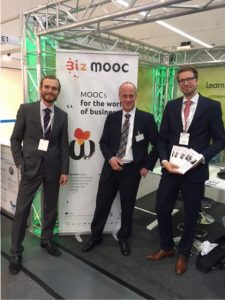BizMOOC is divided into 9 coherent work packages (WP). WP1 – 4 are content based and develop/implement the MOOC BOOK and 3 Pilot MOOCs. WP5 (quality assurance), WP6 (evaluation) & WP9 (project management) facilitate the working steps. WP7 & WP8 ensure dissemination, exploitation & sustainability and create awareness.
WP1
Creates a common body of knowledge and identifies the needs of the target groups “businesses “, “labour force/society” & “HEIs without MOOCs”, serving as the basis for WP2.
Leader: P3 (ES) – University of Alicante
Public outcomes:
- R1.1 Report “State of the Art on existing MOOC knowledge”, consisting of 14 discussion papers, which can be downloaded and or directly read and commented online in the MOOC BOOK:
- 01 About MOOCs, online courses and open education [Online] [PDF]
- 02 Existing MOOC initiatives in higher education and the business sector and the distribution of MOOC learners in EU28 [Online] [PDF]
- 03 Existing types of MOOCs and approaches to MOOC didactics [Online] [PDF]
- 04 Existing MOOC quality models [Online] [PDF]
- 05 Drivers behind MOOCs/reasons to get involved [Online] [PDF]
- 06 Issues for MOOC recognition/certification/accreditation [Online] [PDF]
- 07 MOOC IPR issues [Online] [PDF]
- 08 Existing MOOC business models [Online] [PDF]
- 09 MOOCs and Human Resource Development [Online] [PDF]
- 10 Identification of regions and players lagging behind (no MOOCs by HEIs & businesses, less MOOC learners) [Online] [PDF]
- 11 Identification of existing online learning materials to the key competences “learning to learn” [Online] [PDF]
- 12 Identification of existing online learning materials to the key competences “sense of initiative and creativity” [Online] [PDF]
- 13 Identification of existing online learning materials to the key competences with regards to entrepreneurship/intrapreneurship [Online] [PDF]
- 14 Detailed definition of the key competences “learning to learn, sense of initiative and entrepreneurship (& intrapreneurship), creativity” for the use in the Project [Online] [PDF]
- R1.2 Methodolody for the needs and gaps analysis [PDF]
- R1.3 Report on needs and gaps for the three target groups of BizMOOC:
WP2
Integrates, elaborates and publishes the interactive MOOC BOOK with guidelines, recommendations and good practices for each target group.
Leader: P8 (IT) – DIDA
Public outcomes:
- R2.1 Guidelines for Business, HEIs, Labour Force/Society/Learners
- R2.2 Publication of the MOOC BOOC Version 1.0 (old version, not updated anymore): http://bizmooc.eu/mooc-manual/
- R2.3 Publication of the MOOC BOOC Version 2.0: www.mooc-book.eu > revised and enriched publication with conclusion from Pilot MOOCs, community and expert feedback
- R2.4 (additional result): Open Textbook “Massive Open Online Courses for Business Learning” based on the MOOC BOOK and providing a layouted and structured downloadable version of the MOOC BOOK.
WP3
Produces 3 Pilot MOOCs to the LLL key competences “Learning to learn”, “Sense of initiative (entre-(intrapreneurship)”, “Innovation & creativity” in teams by applying the MOOC BOOK of WP2.
Leader: P3 (UK) – Open University UK
Public outcomes:
WP4
Implements the Pilot MOOCs based on materials of WP2&WP3, evaluates & draws recommendations based on the lessons learnt.
Leader: P5 (PL) – Cracow University of Economics
Public outcomes:
WP5
Quality assurance.
Leader: P11 (NL) – EADTU
Outcomes:
- R5.1 Quality management system (consortium-internal)
- R5.2 Quality Assurance Board
- Marcelo Maina, UOC-Barcelona, Spain
- Gavin Clinch, Institute of Technology, Sligo, Ireland
- Robert Schuwer, Fontys Applied Sciences, Netherlands
- Prof. Christian Spannagel, Pädagogische Hochschule Heidelberg, Germany
- Jutta Pauschenwein, FH Joanneum Graz, Austria
- Patrick McAndrew, Open University UK
- Piet Hendrikx, EADTU, Netherlands
- R5.3 Interim and final quality assurance reports (consortium-internal)
WP6
Evaluation of the project effectiveness and impact.
Leader: P11 (NL) – EADTU
Outcomes:
- R6.1 Evaluation Framework (consortium-internal)
- R6.2 Evaluation and impact assessment reports (consortium-internal)
WP7
Dissemination of the project results to all stakeholders
Leader P6 (SK) – Košice IT Valley, z.p.o.
Public Outcomes:
- R7.1 Dissemination strategy (consortium-internal)
- R7.2 Dissemination materials
- BizMOOC Flyer (5000 printed)
- BizMOOC Poster (A2 Format: 250 printed, B1 Format: 100 printed)
- BizMOOC Roll-Up (12 printed)
- MOOC BOOK Flyer (print on demand)
- MOOC BOOK Sticker (200 printed)
- R7.3 Social Media Campaign
- Project Social Media Channels:
- Researchgate
- Linkedin (page) (group)
- Youtube.com
- R7.4 Final conference [Short summary] [Photos]
Took place on 9.11.2018 with the title “BizMOOC Final Conference: Upgrading Business Competence Globally for Today and Tomorrow” at the Cracow University of Economics, PL. 109 participants f2f,
WP8
Exploitation & Sustainability ensure long-term impact & target group involvement.
Leader P7 (DE) – OpenHPI
Outcomes:
- R8.1 Exploitation and sustainability strategy [PDF]
- R8.2 Round tables (215 participants at 12 BizMOOC round tables):
- 07 December 2017, Potsdam, “Barriers and opportunities to better exploit the potentials of MOOCs”
- 29 May 2018, Burgas, “Barriers and opportunities to better exploit the potentials of MOOCs I”
- 2 June 2018, Burgas, “Barriers and opportunities to better exploit the potentials of MOOCs II”
- 13 September 2018, Graz, „MOOCs – muss das sein? (MOOCs – is that really necessary?)”
- 19 September 2018, Potsdam, “MOOCs machen Karriere – Austausch und Einblicke aus Wirtschaft und Forschung”
- 25 September 2018, Vienna, “MOOCs and student involvement
- 5 October 2018, Alicante, “MOOCs in HEIs and Business”
- 15 October 2018, Kosice, “Board of Director´s meeting”
- 17 October 2018, Rome, “Barriere ed opportunità per esplorare le potenzialità dei MOOC”
- 23 October 2018, Milton Keynes, “BizMOOC Roundtable”
- 3 December 2018, Kosice, “Business stakeholders meeting”
- 13 December 2018, Maastricht, “MOOCs for the world of Business”
- R8.3 BizMOOC community [MAP] 86 institutions provided letters of intent, 106 institutions have been involved in the project´s analysis, and 116,428 individuals been involved in BizMOOC activities.
WP9
Project Management creates an overall umbrella for implementation of all WPs.
Leader P1 (AT) – FH Joanneum
Outcomes:
- R9.1 Project management handbook (consortium-internal)
- R9.2 Project management Cockpit with Dashboard (consortium-internal)
- R9.3 Interim and final Reports (consortium-internal)




